US, Israel set to discuss tackling Iran's nuclear program - Axios
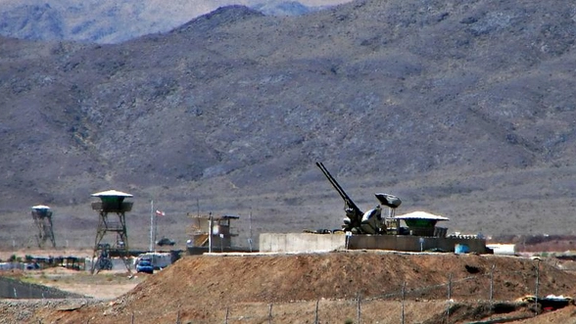
The United States and Israel are set to discuss Iran's nuclear program and potential talks with Tehran early next week, Axios reported on Thursday citing Israeli and US officials.

The United States and Israel are set to discuss Iran's nuclear program and potential talks with Tehran early next week, Axios reported on Thursday citing Israeli and US officials.
The consultations, planned to take place in the White House according to the report, comes amid heightened tensions between Iran and the US, with Trump asking Iran's leadership to choose between a deal and potential military confrontation.
Israel's prime minister Benjamin Netanyahu remains skeptical about the chances of a new deal and seeks to coordinate a response should tensions escalate to military action, Axios said citing an Israeli official.
Iran's supreme leader Ali Khamenei has rejected talks with the US under Trump, recalling that he withdrew the US from a multilateral deal agreed in 2015.
The discussions are expected to be led by Israeli strategic affairs minister Ron Dermer and national security adviser Tzachi Hanegbi and will include senior officials from the the military, Mossad, and Israel's Atomic Energy Commission.
They are set to meet with a US team led by national security adviser Mike Waltz, along with officials from the State Department, Pentagon, and intelligence agencies.
This marks the first gathering of the US.-Israel Strategic Consultative Group since Trump took office.
The forum, which serves as the highest-level platform for U.S.-Israeli discussions on Iran, is expected to lay the groundwork for future policy coordination between the two allies.
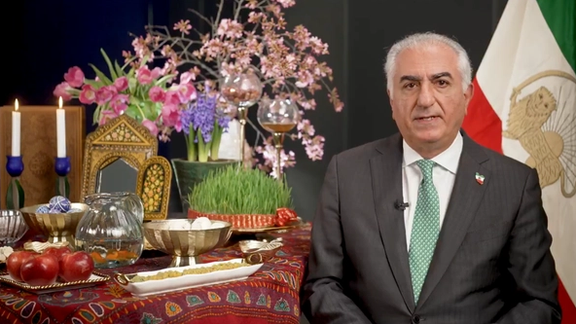
Iran's exiled prince Reza Pahlavi urged world leaders, including US President Donald Trump, to stand with Iranians in their struggle for freedom in an address marking their New Year on Thursday.
"Together, we can dismantle the Islamic Republic and end decades of global terror, blackmail, and hostage-taking," he said in the video, titled A Norooz Message to the World: Imagine a New Iran.
"I extend our hand in friendship and partnership— to our neighbors from Israel and the Arab states, to our steadfast allies in the West, including President Trump and the United States, and to leaders across Europe and the G7," he added.
Pahlavi's remarks come amid rising tensions between Washington and Tehran, following an ultimatum from Trump, who sent a letter to Iran's Supreme Leader Ali Khamenei proposing direct negotiations for a new nuclear agreement or face potential military consequences.
Khamenei rejected Trump's letter last week as deceptive, saying Trump's demands would intensify sanctions and increase pressure on Iran.
"A free Iran is no longer a distant dream; it is a reality being forged today by the hands of its own people," Pahlavi said. "The question is not whether Iran will be free, but which nations will be with us in the fight and make our victory sweeter."
He framed the fall of the Islamic Republic as a turning point for global security, arguing that Iran’s current leadership has fueled instability across the Middle East and beyond.
"This new reality will profoundly benefit not only Iranians but citizens everywhere—from the cities of America to the capitals of Europe, from Israel to the Arab world."
Calling himself a servant of the Iranian people, he declared his commitment to leading what he described as historic change, promising a clear and actionable plan to dismantle the Islamic Republic.
While Pahlavi's supporters view him as a unifying figure in the opposition, some Iranians—particularly those skeptical of monarchy—express reservations about his political vision for Iran’s future.
Pahlavi has made clear in interviews, including in an interview with the German outlet Spiegel, that he does not advocate for either a monarchy or a republic, emphasizing that the Iranian people should determine their future governance through a democratic vote.
Tens of thousands of Iranians gathered at major historical sites across the country on Thursday to mark Nowruz, chanting national and pro-monarchy slogans in defiance of the Islamic government.
"Imagine the Middle East liberated from the shadow of nuclear blackmail and threats. Imagine our region without endless proxy wars, extremist ideologies, and terrorism—all driven by a regime whose policies have caused mass migration, instability, and suffering far beyond Iran’s borders," he added.
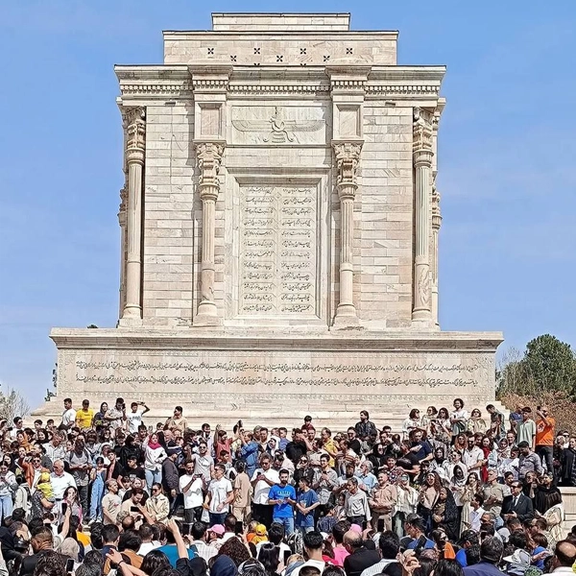
Iranians gathered at major historical sites across the country to celebrate the New Year with patriotic chants calling for the return of the pre-Islamic Revolution monarchy.
At Persepolis, the ancient ceremonial capital of the Achaemenid Empire in Fars province, large crowds counted down to the arrival of spring, undeterred by state efforts to downplay the celebration in favor of religious mourning.
At several locations people chanted the name of Reza Shah, the founder of the Pahlavi Dynasty, who began modernizing Iran a century ago.
Authorities had promoted religious programming tied to the anniversary of Imam Ali’s killing, which coincided with Nowruz this year, but videos circulating online showed Iranians defying the official narrative.
In Shiraz, at the tomb of the 14th-century poet Hafez, a large crowd sang Ey Iran, a patriotic anthem often associated with opposition to the current leadership.
Even in Khorasan Razavi province, home to the Shiite shrine city of Mashhad where Supreme Leader Ali Khamenei’s representative Ahmad Alamolhoda has banned concerts and other cultural events, people gathered at the tomb of Ferdowsi. The 10th-century poet is known for his epic Shahnameh, which extols Iran’s pre-Islamic history.
Chants of “Reza Shah, rest in peace” and “Shah, come home” were heard in Tous, 30 kilometers from Mashhad, where Ferdowsi’s tomb stands.
Demonstrators invoked the name of exiled crown prince Reza Pahlavi and compared Khamenei to Zahhak, the mythical tyrant from the epic of Shahnameh whose reign was marked by oppression and corruption.
The anger directed at Khamenei was also fueled by Iran’s worsening economic conditions. According to the Iranian Statistics Center, inflation surged by 4.1% in February 2025, the highest monthly rate in two years. The US dollar reached 1,000,000 rials just days before Nowruz, reflecting deep economic instability.
Khamenei, in his annual address, did not extend Nowruz greetings and instead focused on Ramadan’s Nights of Qadr, calling the economy the year's main issue.
The confluence of Nowruz and Ramadan has heightened tensions, with authorities emphasizing religious adherence.
In the wake of the 2022 uprising, New Year celebrations been turned into an ever growing display of defiance, and in some cases, open protests against the government.
On Tuesday, protests broke out in cities such as Tehran, Karaj, Mashhad and Isfahan, with young Iranians setting fire to images of Supreme Leader Ali Khamenei.
While the government attempted to impose a somber tone on the holiday, the scenes across Iran highlighted a growing divide between state ideology and public sentiment.

The United States issued new Iran-related sanctions on Thursday, targeting one individual, several entities and vessels linked to Iranian oil trade as part of President Trump's pressure campaign on Tehran.
“Teapot refinery purchases of Iranian oil provide the primary economic lifeline for the Iranian regime, the world’s leading state sponsor of terror,” said Secretary of the Treasury Scott Bessent in a press release announcing the new measure.
“The United States is committed to cutting off the revenue streams that enable Tehran’s continued financing of terrorism and development of its nuclear program.”
The sanctions target a Chinese refinery, Luqing Petrochemical, which the US Treasury accused of purchasing Iranian crude worth half a billion dollars.
The refinery allegedly received oil from vessels linked to the Yemen's Houthis and Iran’s Ministry of Defense and Armed Forces Logistics. Its CEO, Wang Xueqing, was also sanctioned.
Nineteen more entities and vessels were also designated that the US treasury said involved in transporting Iranian oil as part of Iran’s "shadow fleet," which US officials say engages in deceptive shipping practices.
Among them are the Natalina 7, Catalina 7, Aurora Riley, Viola, Montrose, Volans, Brava Lake, and Titan. Companies registered in Hong Kong, Panama, Liberia, Seychelles, and the British Virgin Islands were also sanctioned for allegedly owning or operating these vessels.
In a separate announcement, the State Department said it is sanctioning a crude oil and petroleum products storage terminal in the port of Huizhou, China, for receiving and storing Iranian-origin crude oil from a blocked tanker.
The terminal, owned and operated by Huaying Huizhou Daya Bay Petrochemical Terminal Storage Co., Ltd (Huaying Petrochemical), offloaded approximately one million barrels of Iranian crude in late January 2025 from the US-designated tanker formerly known as Spirit of Casper and Nichola. The State Department said Chinese terminals play a critical role in facilitating Iran’s energy exports and sustaining its revenue streams.
The new sanctions come a day after the US State Department’s Rewards for Justice program announced it is offering up to $15 million for information on four Chinese individuals accused of supplying Iran’s Islamic Revolutionary Guard Corps (IRGC) with US-controlled technology.
Last Thursday, US Treasury sanctioned Iran's Oil Minister Mohsen Paknejad, several oil tankers, and commercial entities.
Washington has been ramping up sanctions on Iran's oil exports since the latter days of the Joe Biden administration, as part of US President Donald Trump renewed "maximum pressure" campaign, aimed at cutting Iran’s oil exports to zero in a bid to force Tehran into talks over its nuclear program.
The sanctions mark the fourth round of US measures targeting Iran's oil sector since Trump took office on January 20, 2025.
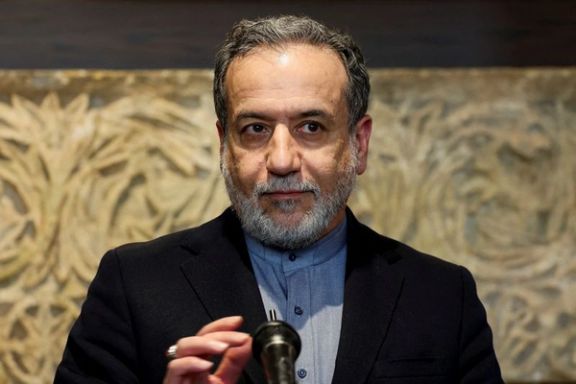
Iran will consider the opportunities as well as the threats in the recent letter from US President Donald Trump, and will soon respond, Foreign Minister Abbas Araghchi said on Thursday.
Iran's Supreme Leader Ali Khamenei rejected Trump's letter last week as deceptive, saying Trump's demands would intensify sanctions and increase pressure on Iran.
Araghchi said Tehran was still evaluating the letter and weighing its response. "Trump’s letter was more a threat, but it claims to offer opportunities. We paid attention to all points in the letter and will consider both threat and opportunity in our response.”
"There is an opportunity behind every menace."
Araghchi said Tehran would respond to Trump's letter in the coming days via appropriate channels, rejecting any direct negotiations as long as Washington levels pressure, threats and sanctions.
On Wednesday, Axios reported that Trump's letter gave Iran a two-month deadline to reach a nuclear deal or face stricter sanctions under the US President's renewed maximum pressure campaign.
In his first term, Trump withdrew the US from the 2015 JCPOA nuclear deal between Iran and major powers that had placed strict limits on Tehran's nuclear activities in exchange for sanctions relief.
After Trump's withdrawal in 2018 and re-imposition of sanctions, Iran breached and far surpassed the agreement's limits in the development of its nuclear program.
Western powers accuse Iran of seeking nuclear weapons by enriching uranium up to 60% purity, above what they say is justifiable for a civilian program.
Tehran says the development of its nuclear program is for peaceful purposes and that it respects its commitments under international law.
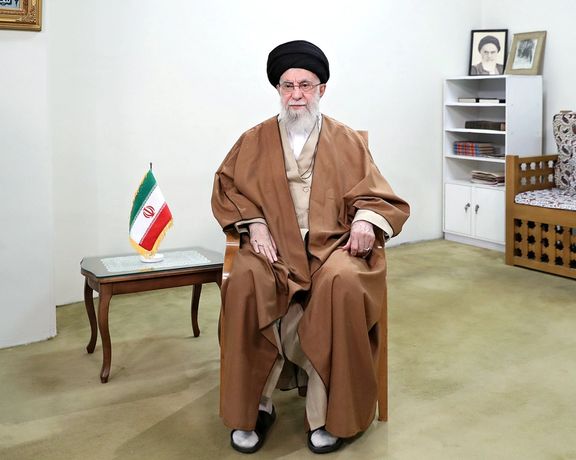
Iran's Supreme Leader made no reference to the possibility of negotiations with the United States in his annual New Year message. Instead, he reiterated his condemnation of the US for events in Gaza and Yemen.
In his pre-recorded message marking the start of the Iranian year 1404, Khamenei accused the US of responsibility for the war in Gaza, saying, “America, undoubtedly, bears responsibility for this disaster.”
He said that the attacks occurred either at Washington’s behest or with its approval and declared, “America is also a partner in this crime.” Drawing a parallel to Yemen, he condemned the strikes on civilians as a crime that must be stopped.
Since 1989, after assuming his position, Khamenei has traditionally visited his hometown of Mashhad for Nowruz, delivering a speech at the shrine of Imam Reza, the eighth Imam of Shia Islam.
These speeches were typically broadcast live on state television. However, for the second consecutive year, Nowruz has coincided with Ramadan, perhaps prompting him to remain in Tehran instead. During the COVID-19 lockdowns in 2020 and 2021, he similarly stayed in Tehran and issued pre-recorded messages.
Some observers, however, drew attention to the tense geopolitical conditions in the region and mentioned the possibility that Khamenei preferred to stay
The region's heightened geopolitical tensions raised questions about his decision to choose a safe and protected location.
In his address, Khamenei compared the previous year to 1981, a period of significant turmoil in the history of the Islamic Republic, when it was at war with Iraq.
He described 1403 as a challenging year for the Iranian people, citing major events such as the death of President Ebrahim Raisi in a helicopter crash in June and ongoing economic hardships.
In 1980, two years after the Islamic Revolution, Iran faced significant setbacks: territorial losses to Iraq in the southwest, the impeachment of President Abolhassan Banisadr, and the assassinations of President Mohammad-Ali Rajaei and Prime Minister Mohammad Bahonar by the Mujahedeen-e Khalq Organization (MEK).
Since 1998, Khamenei has assigned a theme to each new year in his Nowruz speeches, often focusing on economic issues.
Previous years' themes included 'National Unity,' 'Economic Jihad,' and 'Resistance Economy.' Last year focused on 'Leap in Production with People's Collaboration,' and this year's theme is 'Investment for Production,' as announced in his speech.
Khamenei conceded that the previous year had fallen short of expectations, emphasizing that the economy would be the central focus for the coming year.
He highlighted economic pressures and livelihood difficulties as other key events of the year, while praising the strength of will and spiritual morale of the Iranian people in facing these challenges.
He pointed to the swift presidential election and public aid to Lebanon and Palestine as demonstrations of this resilience.
Khamenei's address, devoid of Nowruz symbols and failing to offer new year greetings to people, highlighted the clear prioritization of religious observance, a theme echoed more boldly in the president's Nowruz message that also focused on Ramadan.